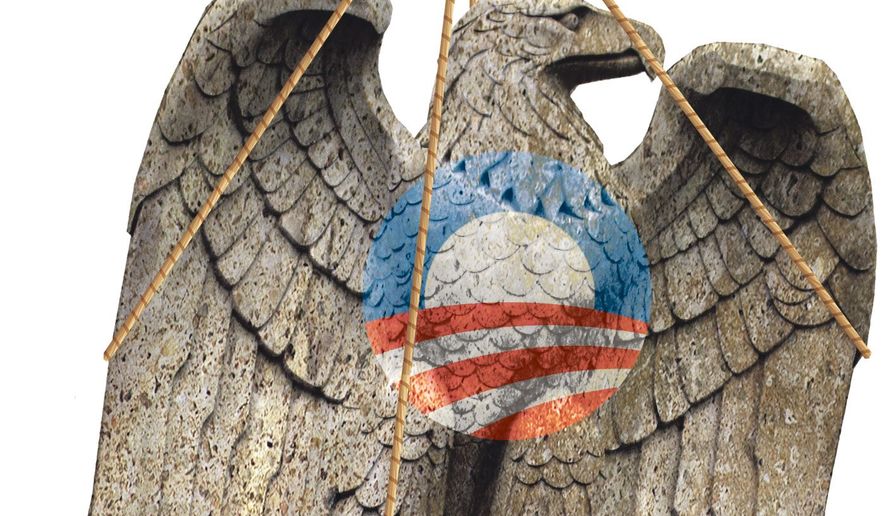OPINION:
In its most recent “Two Minutes Hate” on President Trump, The Nation magazine’s hyperbolic headline warned, “Leaked Draft of Trump’s Religious Freedom Order Reveals Sweeping Plans to Legalize Discrimination.” Claiming that if signed, the president’s order “would create wholesale exemptions for people and organizations who claim religious objections to same sex marriage, premarital sex, abortion and trans identity, The Nation predicts that the order would “exceed the authority of executive branch,” and “risk violating the Establishment Clause of the first Amendment to the Constitution.”
Rather than “legalizing discrimination,” the Trump religious freedom order will finally end the current discrimination against religious organizations. As a sociology professor at Franciscan University of Steubenville, Ohio, one of 43 Catholic organizations, including the University of Notre Dame, that sued the federal government in 2012 over the Obama administration’s Health and Human Service (HHS) mandate on “preventive service,” I have already witnessed the illegal discrimination against religious institutions by the unjust HHS mandate. The mandate required all organizations — including religious institutions — to provide insurance coverage that included abortion-inducing drugs, and sterilization procedures. The HHS mandate forced all religious employers to pay for products and services that are in opposition their deeply held moral and religious beliefs. Religious institutions have already experienced the compromise of our right to religious freedom. We have already been discriminated against.
Refusing to define Catholic and Christian colleges and universities as “religious employers,” the Obama administration targeted us — making the insurance coverage mandatory — violating the consciences of people of faith and infringing on our rights to practice our religious beliefs. Like many of my colleagues, we were drawn to teach on Catholic campuses because we knew our religious rights would be respected. We knew we would not be asked to contribute to causes that are contrary to what the church teaches. We knew that our conscience rights would be protected.
Those protections ended with the Obama administration’s HHS mandate on religious institutions. But the mandate was just the start. Rejecting the religious liberty claims of religious schools at all levels, the Obama administration has forced some schools to accept as leaders and faculty members those who openly disavow the faith and teachings of the church. In 2015, Mr. Obama’s Equal Employment Opportunity Commission (EEOC) determined that “there is reasonable cause to conclude that a fired Macon, Georgia’s Mount deSales Academy band director Flint Dollar was discriminated against because of his sexual orientation.” School President David Held released a letter in 2014 that claimed Mr. Dollar was not fired because he was gay but because same-sex marriage is against Catholic doctrine. Yet, Chai Feldblum, a former Obama EEOC appointee, wrote that when it came to gay rights or women’s rights, she was “having a hard time coming up with any case in which religious liberty should win.” In September 2016, the U.S. Commission on Civil Rights issued a report that called religious freedom a “code word for intolerance.”
A huge increase in attacks on religious liberty occurred in 2016. Kelly Shackelford, president of the religious liberty law firm First Liberty Institute, has said that the biggest danger area is religious liberty in the workplace. Oscar Rodriguez, an Air Force veteran who was physically removed from a colleague’s retirement ceremony because he was giving a flag-folding speech that included the word “God,” Aaron and Melissa Klein, who refused to bake a cake for a same-sex wedding, and U.S. Marine Monifa Sterling, who was convicted in a court martial for not removing a scripture verse from her own work area, are just a few of the most recent examples of people who have lost their livelihoods because of discriminatory attacks on their religious liberty by the Obama administration.
We are already at a place where the establishment clause has shifted from a legitimate desire to keep the government from entangling itself in the internal affairs of religious organizations to a justification of anti-religious secularism — pushing religion (and people of faith) out of the public square. This threatens all people of faith. And Mr. Trump knows that. It is one of the main reasons that people of faith voted for him.
The leaked draft of Mr. Trump’s executive order maintains that as a matter of policy, “Americans and their religious organizations will not be coerced by the Federal Government into participating in activities that violate their conscience.” It protects the tax-exempt status of any organization that “believes, speaks, or acts in accordance with the belief that marriage is or should be recognized as the union of one man and one woman.” And it protects all religious institutions by clearly stating, “Religious freedom is not limited to religious exercise that takes place in houses of worship or the home. It is guaranteed to persons of all faiths and extends to all activities of life.”
Many of those who voted for Donald Trump have already been injured by the discriminatory attacks against religious liberty by the Obama administration. Their constitutional right to religious freedom has already been compromised. President Trump has promised to end that discrimination by protecting and defending religious liberty. The draft of his executive order is a great start.
• Anne Hendershott is professor of sociology and director of the Veritas Center for Ethics in Public Life at Franciscan University of Steubenville, Ohio. She is author of “Status Envy: The Politics of Catholic Higher Education” (Transaction Publishers, 2009).




Please read our comment policy before commenting.